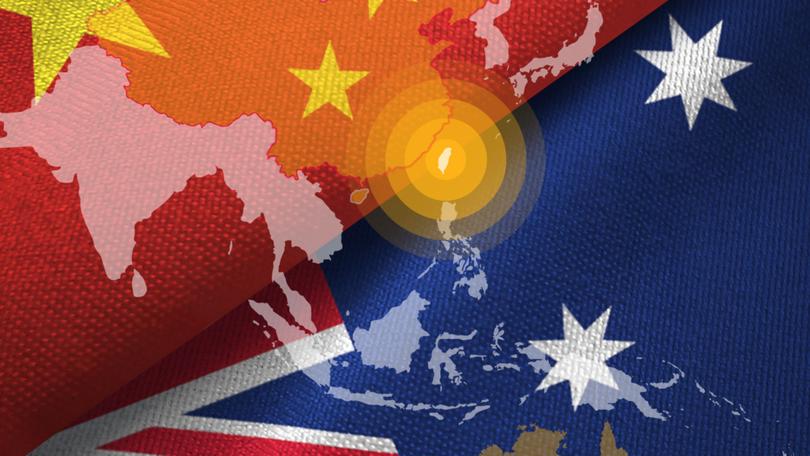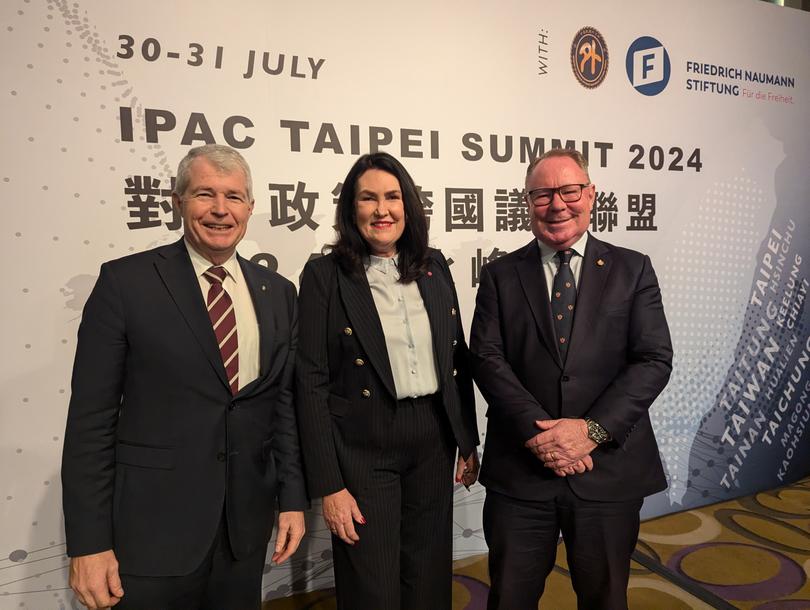Aussie MPs issue grim warning for Australia if China attacks Taiwan
Australian MPs attending an international gathering supporting Taiwan have said Australia’s future is also in peril if China attacks it, with one describing the disputed island as “the canary in the coal mine”.

Australian MPs attending an international gathering of parliamentarians supporting Taiwan have said Australia’s future is also in peril if China attacks it, with one describing the disputed island as “the canary in the coal mine”.
Labor Senator Deborah O’Neill, Liberal Senator David Fawcett and NSW Labor MP Hugh McDermott made the comments in an exclusive joint interview with The Nightly on the sidelines of the Inter-Parliamentary Alliance on China’s annual summit in Taipei.
Asked if Australia would defend the self-ruled democratic island of Taiwan, should China attack it, as President Xi Jinping has threatened, the MPs said every Australian would be immediately poorer in that scenario.
Sign up to The Nightly's newsletters.
Get the first look at the digital newspaper, curated daily stories and breaking headlines delivered to your inbox.
By continuing you agree to our Terms and Privacy Policy.“The nations which we’re working closely in defence with are all countries that have said they’d defend Taiwan,” Mr McDermott said.
“If it ever comes to that situation then I have no doubt the Australian Government would have to seriously consider its position about what we’d do.”
Opposition Leader Peter Dutton also invoked the AUKUS agreement and ANZUS alliance when asked the same question in a recent interview.
Senator Fawcett, a retired Lieutenant Colonel, said any move on Taiwan would signal a broader conflict.
“The real issue is, even if the trigger was conflict over Taiwan, what it would be is actually a war on the global rules-based order,” the South Australian Senator said.
“Because if Taiwan goes all credibility of the system would go.
“So it wouldn’t be so much, we’re getting involved just because we want to support Taiwan, it would be - Taiwan is the canary in the coal mine and if they go, we all go eventually.”
Mr McDermott said Australian and Taiwanese democracy were both under threat.

“Their future is as much at peril as ours is,” he said, adding that the world economy would be “thrown into chaos” if conflict erupted.
Senator Fawcett cited estimates that every Australian would lose 14 per cent in their take-home pay if China even tried to blockade Taiwan, as opposed to launching an outright invasion.
“So even just a blockade, let alone a full-out conflict, will have a huge impact,” he said.
Asked why they had travelled to Taiwan, a self-ruling island that China’s President Xi Jinping has previously said he wants to unify with the mainland, and by force if necessary, the MPs said protecting democracy was above party politics and transcended borders.
They stressed that the priority was to deter China and encourage Xi to stop his increasingly hostile behaviour towards the Taiwanese which includes more military drills across the Strait.
The Inter-Parliamentary Alliance on China unites MPs from around the world from various political parties to pressure their own governments to take stronger stances towards the Chinese Communist Party (CCP).
It was formed in the wake of the pandemic and one of its earliest campaigns was to rally support for Australian winemakers following China’s economic coercion.
Senator O’Neill said the trio were attending the Taipei summit in solidarity but to also show that democracy can never be taken for granted.
“We’re all in it together, ultimately,” she said, adding this went for the business community as well.
“What we need to see from business is a more sophisticated understanding of its parallel responsibility with legislators and political representatives.”
Trade Minister Don Farrell has regularly praised the Australia-China trading relationship — Australia’s largest — for exceeding its pre-pandemic levels, reaching a record $327 billion last year.
But asked if she wanted to see Australian business increase their diversification away from China, Senator O’Neill said: “Yes”.
“I think that’s going to need a change of gears for a more integrated effort in defence of democracy not just by legislators but by the entire civil society, including business,” she said.
She declined to name specific businesses when pressed.
“No examples,” she said.
“There are many multinational companies that know no borders.
“What are the security arrangements about the sharing of information that they’re acquiring in democratic countries that could be flowing into China?”
She said her own experience leading the charge against PwC, whose consultants used confidential information about the Australian government’s tax plans to advise their global clients how to organise their tax arrangements to avoid them, had caused her to worry.
“I fear after my interactions with the audit sector that there are many multi-national companies who believe they exist outside and above the law.”
She said business had a direct stake in helping governments protect the peace, as it safeguarded the ability to safely ship goods around the world ultimately leading to prosperity.
“People who are in enterprise, people of business, they need those basic things to be in place and this is not a project solely for legislators and for politicians,” Senator O’Neill said.
The trio said that Australians were prepared to pay more for critical goods to protect their own security and advocated re-shoring the production of goods like medicines and critical minerals at home and with friendly countries instead of in China.
But in reality, China has become the dominant buyer of Australian lithium, used to make batteries for electric vehicles. The EU and United States are battling to try and prevent China from completely dominating the market.
According to the Australian Bureau of Statistics, China accounted for 85 per cent of the total value of lithium exports and more than 94 per cent in every month of 2022.
In June 2022, as China’s punitive tariffs still applied, Australia exported $1.1 billion worth of lithium to China — 97 per cent of all lithium sent from Australia that month.
China’s status as Australia’s biggest customer was underlined when Premier Li Qiang toured a lithium factory in Western Australia on the final day of his recent visit to Australia.
Senator Fawcett likened it to the abolition of slavery, which took around 30 years of campaigning before it was ended.
“It will take us a while to break some of the models here, but that’s the sort of area of where we need to be going,” he said.
“We need to actually put in place government-to-government structures that will allow our industry to overcome the price cutting and undermining that Russia, Kazakhstan, China and others do around critical minerals.”
The trio said Australians would consider it a “no-brainer” to pay more to produce important goods at home.
But while the government has released a Made in Australia policy to spur domestic industry, Labor has also expressly said it wants to deepen trade ties with China.
For example, Mr Farrell has said he wants Australia’s trade with China to exceed the $400 billion mark, having already broken through the $300 billion threshold for the first time last year.
China’s foreign ministry spokesman Lin Jian said “the win-win nature of China-Australia trade ties” brought enormous benefits to Australians.
“China’s development is an opportunity, not a challenge for Australia,” he told reporters on Friday.
China still restricts imports of Australian lobsters, an action it introduced after former Prime Minister Scott Morrison called for an inquiry into COVID.

